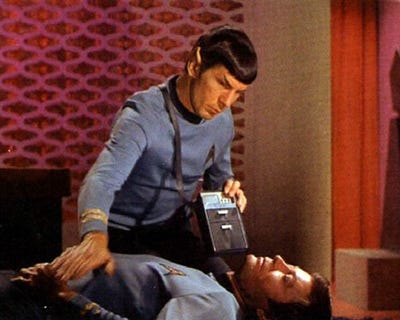Seller of Fake 'Star Trek' Medical Devices Sentenced to Prison
December 7, 2016
An Illinois conman was sentenced to five years in prison this week after being found guilty of selling fake Star Trek-inspired medical devices.
Kristopher Sturgis

Howard Leventhal, a fraudster from Grayslake, IL, received a five-year prison sentence this week after a New York federal judge convicted Leventhal for conning investors with a healthcare device that he claimed would function like Dr. James McCoy's tricorder device on Star Trek. The 60-year-old defendant made a last ditch appeal for leniency on Tuesday before being sentenced to five years behind bars, and ordered to pay over $1.3 million in restitution to the victims of the scam.
Leventhal swindled investors with the claim that his company, Neovision USA Inc., would market the tricorder-like device as "Healtheo's McCoy Home Health Tablet." Leventhal also set up a website for Health Technologies Corp. that claimed the device would be monitored "24/7/365 by the company's nurse-staffed call center."
Unsurprisingly, this isn't Leventhal's first run in with the law. In 2013 he was accused of impersonating a Canadian deputy health minister as part of a fraud scheme that resulted in a guilty plea for wire fraud and aggravated identify theft. At the time, Leventhal was accused of trying to defraud various individuals and entities of millions of dollars when he claimed his company Neovision had secured a lucrative contract with the Canadian Health Department.
The entire scheme unraveled when Leventhal eventually attempted to defraud an undercover FBI agent with fabricated bank documents and a forged signature of a Canadian deputy health minister.
Before his sentencing on Tuesday, Leventhal tried to flex his persuasive skills one last time when he plead for leniency to Brooklyn federal court Judge Brian Cogan. In a 40-minute presentation, Leventhal detailed his post-conviction plans to open a rehabilitation camp for ex-convicts called "Heroes @ The Gate." His proposal included rehabilitating ex-convicts through flying lessons, wood and metal workshops, 3-D printing, and web coding seminars.
Leventhal assured the judge that the program would aim to prove to ex-cons that anything is possible -- and the program would conclude with an awards ceremony featuring a medal in Judge Cogan's name.
Ultimately his efforts fell short, as Cogan wasn't buying Leventhal's sales pitch, telling reporters after the trial that Mr. Leventhal doesn't see things clearly, and he doesn't think he's ever going to change.
In addition to the five-year sentence, Cogan also ordered that Leventhal be barred from filing any lawsuits without the judge's approval, a stipulation that was made following Leventhal's attempt to sue virtually everyone involved in the case, including federal prosecutor Winston Paes. Leventhal will also face three years of supervised release upon the completion of his sentence.
Kristopher Sturgis is a contributor to Qmed.
Like what you're reading? Subscribe to our daily e-newsletter.
About the Author(s)
You May Also Like
.png?width=300&auto=webp&quality=80&disable=upscale)

